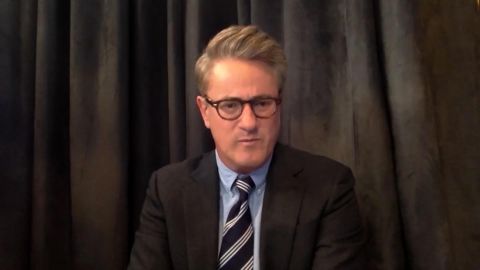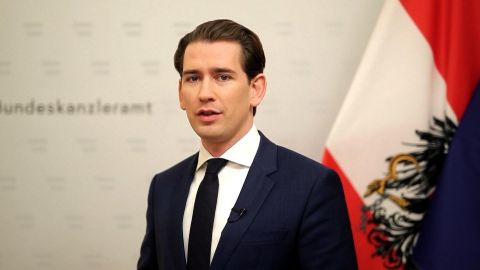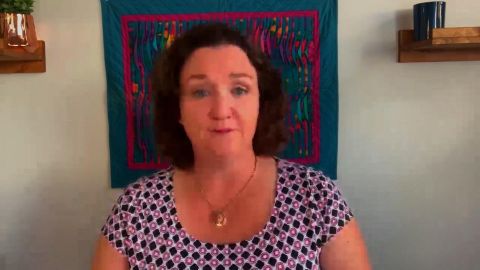Read Transcript EXPAND
CHRISTIANE AMANPOUR: And turning now to you someone who has been named to the “Time” 100 list of the world’s most influential people. He is Joe Scarborough, a former Republican congressman from Florida turned cable news star, best known as the co-host of MSNBC’s “morning joe.” His latest book, “Saving Freedom,” takes a look back at President Truman and the historic forces that moved him to unite the western world against soviet communism. Here he is speaking to our Walter Isaacson about it and about the future of conservatism in the United States after Trump.
(BEGIN VIDEOTAPE)
WALTER ISAACSON: Thanks, Christiane. And, Joe Scarborough, welcome to the show.
JOE SCARBOROUGH, AUTHOR, “SAVING FREEDOM”: Thank you so much, Walter. It’s an honor being here.
ISAACSON: You know, this is the timeliest of all books, writing a book about Truman coming into power just as Biden comes into power. Why did you pick to do this book?
SCARBOROUGH: Well, you know, I had had started to write a book about Trump, and it had actually been through three or four drafts of a book on my experiences with Trump, and then I said, I can’t do it. The message that we need to put out there is what type of leader we need right now. And I thought Harry Truman was the perfect example for so many reasons. But Truman’s not just the anecdote to Donald Trump but to everything that’s happened over the past 20 years. I think politicians like myself and people that followed me, and I think a lot of us in the media have failed time and again to explain to the American people why America needs to be involved in the world, why NATO is still relevant, why foreign aid is so critical, how we get back so much more than we send out whenever we’re engaged in the world, and that’s a lesson. Harry Truman’s life, Harry Truman’s career I think teaches that lesson better than any other president in the post-war era.
ISAACSON: Your book, “Saving Freedom,” really talked about the creation of the Atlantic Alliance. In some ways, it needs to be revived now. Do you see lessons from the way we did it the first time?
SCARBOROUGH: Well, I do, and I think Joe Biden is following those lessons. You start by having great men and women around you. I remember reading “The Wise Men” and the I remember the example that Harry Truman set and FDR set by having people like General George Marshall around them, the man who is the organizer of the allied’s victory in World War II. I love what your book said about Averill Harriman. There’s no substitute for experience. Averill Harriman was a great ambassador to the Soviet Union because the first time he visited Russia was in 1899 when Nicholas II was czar. Now, that’s some deep experience. And I look in Washington and, you know, I get tired of hearing people telling me, you know, how frustrating Washington is, how it’s hard work, how the system doesn’t work, how — you know, at Tom Ricks says in his new book “First Principles,” Madisonian democracy, the checks and balances, the frustrations, that’s not a bug. It’s a feature and — that you get through that by doing what Harry Truman did, surround yourself with the best people, take their advice most of the time and work with people in the other party.
ISAACSON: Truman was a man of the Senate and he really knew how Washington worked. Is that why he ended up being more successful than people thought he would?
SCARBOROUGH: Definitely. I mean, look at three of the most successful presidents of the post-war era, Harry Truman on foreign policy, without a doubt, LBJ, domestically, what he did in ’64 and ’65 was a revolution, a civil rights revolution and then Ronald Reagan. You had a guy from Eureka College and Reagan, LBJ went to, I think, what was it, Southwest Texas Teachers College and Harry Truman graduated from Spalding Commercial College in Kansas City. And yet, what LBJ and Truman had in common is that they were creatures of the Senate. They knew how to gain majorities. Ronald Reagan was a conservative in California who had to deal with a liberal legislature for eight years. And so. they all understood what Bismarck said and that is that politics is the art of the possible. Something Bill Clinton, the Democrat, in a conservative state figured out in his 12 years as governor in Arkansas and that’s why, you know, he ran us Republicans around in circles throughout most of the ’90s.
ISAACSON: Why did compromise become such a bad word and Washington expertise become so devalued?
SCARBOROUGH: I don’t know. I think a lot of it actually has to do with social media. I remember when the debate was raging on Obamacare, the Affordable Care Act back in 2009. I remember having Governor Rendell on stage, and somebody asked, why can’t we get anything done? And Rendell said, well, you know, if — though Joe and I have very different views about what the federal government should do when it comes to health care, I have no doubt I can go back in a room and sit down with him and we could figure out — we could hammer it out and find a middle ground that probably would end up working better than what we would have come up by ourselves, he said, but the second I walk into that room, somebody would send out an e-mail, somebody would send out a tweet and pretty soon my office would be overcome with angry callers telling me not to sell out to Republicans. The same thing, of course, happens on the other side, too. I am very excited though. I think the 2020 election. There are a lot of things that concerned me like Donald Trump getting 72 million votes, 73 million votes, but the Senate is actually becoming a more moderate place. We saw sort of the hollowing out of the center. Everybody always talked about on the right wing the Tea Party Republicans were far more conservative. But starting in 2006, Democrats became more liberal as red state Democrats like Ben Nelson started to leave. And so, now, we — I think we’re going to have a pretty strong center with Joe Manchin, Mark Kelly, Kyrsten Sinema who usually votes with Joe Manchin, Governor Hickenlooper. And then you add to that Mitt Romney and Susan Collins, and I know it will surprise a lot of people, but watch Lindsey Graham. Lindsey can’t help but get in the middle of everything. I think Lindsey is going to be a part of, not only this COVID compromise, but a lot of compromises moving forward.
SCARBOROUGH: When Harry Truman gets called to the White House by Steve Early, I think it was the press secretary, finds out that Franklin Roosevelt has died, it’s the beginning of one of the most dangerous transitions we’ve ever had. Explain what he faced.
SCARBOROUGH: Yes. It was a far more dangerous transition than what we’re going through right now. I know that’s hard to believe. But Harry Truman was campaigning with Franklin Roosevelt, and Roosevelt knew he was going to die. FDR told Truman, stay off of planes. One of us has to stay alive. As Truman went into the White House for the first time, one of his friends said, you know, you’re going to be president soon, he said, well, it scares the hell out of me. But, yes, I think you’re probably right. FDR was having chest pains the day he was inaugurated. And yet, despite all of that he was extraordinary — despite the fact that he was perhaps the greatest president of the 20th century, he was extraordinarily reckless in what he knew was going to be a transition to a guy that wasn’t ready to be president despite his experience in the Senate. They only had two meetings when they got into the White House, by the time they got into the White House together. And, of course, the first time he found out about the Manhattan Project, Truman was after his first cabinet meeting when Simpson took him to the side and said, hey, we’ve got this thing called the Manhattan Project, and read him in. And yet, Truman was able to not only respond to that information and help us win the wars in the Atlantic and the Pacific but also, of course, face more incoming, face more crises over the next two or three years than most presidents have face over eight years, two terms.
ISAACSON: In 1947 after the war had been won, Americans were basically isolationist. Averell Harriman said they just wanted to go to the movies and drink coke. And yet, Truman then has to give this important speech where he said, no, we must stay engaged in the world. Tell me about that speech and how you would convince people today that we must stay involved in the world.
SCARBOROUGH: Well, I think Joe Biden is going to have to give that speech. It’s going to be critical that we re-engage our allies. That’s the first task he’s going to have to do. We’re going have to re-are engage our allies. We’re going to have to figure out how to re-engage Russia in a balanced, meaningful way. And, of course, the greatest challenge is going to be how we stay engaged with China. There is pressure on the left and the right for the United States to be confrontational towards China, and I understand that. There have — we have defense issue. We obviously have deep concerns over Hong Kong, deep concerns over concentration camps, but we have to stay engaged. We have no choice. And for Truman, he knew when he was making that speech that he was going to have to pull the American people along, and he sent his people up to the hill and they went up and they were saying, this is about Greece and this is about Turkey. Truman all along made a speech, he was clear who it was about, it was about the Soviet Union, but he never mentioned the Soviet Union’s name in that speech and kept it to Greece and kept it to Turkey. One other thing, he was also very realistic about who we were helping in Greece and let Republicans know and let the American people know that the Greek government, they were no saints. They were right wing authoritarians who had a long way to go before they reached whatever our ideas of democracy would be. But taken on balance, it was a far better choice than having Stalin come in and support the Greek communists.
ISAACSON: Unlike Franklin Roosevelt, Harry Truman fully understood, came to deeply believe how important it is to stop the spread of the Soviet Union and stop the spread of communism. How could a failed haberdasher from Kansas City, Missouri, have had such a good fingertip feel for what this was all about?
SCARBOROUGH: That’s a great mystery. I think part of it had to do with humility. FDR, again, one of the great president not only of the 20th century but this country’s history had a certain arrogance about it, and he thought that personal diplomacy could make a difference, make a significant difference. And there he was at Yalta mocking Winston Churchill behind Churchill’s back to Stalin and believed that he could work through it with him. And Harry Truman, the first night he was in the White House and was looking through notes from Kennan and others grew deeply concerned about the Soviet Union. And he had — you’re right. He had a great fingertip feel. And when Harriman came to him with concerns and when Acheson came to him with concerns, he listened to them and understood. And certainly, when General George Marshall shared those concerns, a man that Truman respected above all others then went to the Soviet Union and came back and reported to Truman that this was the right thing to do, then Truman had the courage of his convictions to move forward.
ISAACSON: One of the most important things Truman did in my mind was integrating the armed forces and changing on rates a bit. You and I are both sons of the south.
SCARBOROUGH: Right.
ISAACSON: We grew up watching populists in the south either play the race card or deciding not to. How does Truman decide not to and how is that important in our history?
SCARBOROUGH: It’s extraordinary. And this what — I know, it’s what you love in history, it’s what I love as you read in history and you watch leaders grow. You take LBJ who mocked Richard Nixon for being too progressive on civil rights in the 1950s. Do what he — move from where he was in 1957 to where he was in ’64 and ’65. It’s an extraordinary growth. And it’s the same thing with Harry Truman who was the son of parents who had confederate leanings. He was racist, Truman, was racist even for his own time through his early life and into his mid-life. And yet, in 1948, for him to make the most significant civil rights move since reconstruction was an extraordinary moment, the integration of the armed forces was something that really showed Truman’s growth and also showed that he understood the sacrifice that black Americans had made during World War II and that the United States needed to move forward on race, and no one would have expected that. And Truman actually paid for that, of course, at the ’48 convention from Strom Thurmond and the Dixiecrats stormed out. So, he not only was facing Henry Wallace on his left, he was now facing because — he integrated the armed forces, he was now facing tropical Strom Thurmond on his far right and, of course, Dewey on the Republican side. So, he paid politically for what he did. But, as always, if Harry Truman believed what he did was right, he’d fixed himself a sandwich, he’d drink a glass of milk and he’d go to bed feel just fine.
ISAACSON: As somebody who was once a Republican and a conservative and to some extent a populist, what is the future? How does conservatism in America regain its footing after Trump?
SCARBOROUGH: I don’t know. I really don’t care about the Republican Party and I never did. I considered myself a small government conservative. Do I care about — it doesn’t hurt me that the Republican Party has collapsed and I believe are going the way of the Whigs and deserve to go the way of the Whigs. It does hurt me that the movement of Edwin Burke And Russell Kirk and, yes, Ronald Reagan and Margaret Thatcher has sullied itself the way that it has. I really — I don’t know that there is a conservative movement now. If you — again, I focus a lot on what Russell Kirk wrote in “The Conservative Mind” and you look at the fact that conservatism, as defined by Russell Kirk and Bill Buckley, was supposed to be very skeptical of ideologies and rigid approaches towards politics, and I just don’t see — I don’t see conservative movement out there that’s worth saving. And I was very proud to be a conservative, proud to be a Republican, but, my God, I haven’t been proud to be either in about 20 years. So, I don’t know what the future is for the Republican Party. I don’t know what the future is for the conservative movement. But right now, it’s not good because it looks a lot more like what’s happening in Poland and Hungary than what Edmund Burke or Russell Kirk ever talked about.
ISAACSON: What’s the most important lesson from Harry Truman, his character and his conduct that Joe Biden could learn?
SCARBOROUGH: I think perseverance, and it’s something that Joe Biden has shown time and again. But I just think Harry Truman having the perseverance to keep moving forward, despite the fact that he was constantly ridiculed, constantly mocked, constantly dismissed as a rube, as a strange little man from Missouri, as the second Missouri compromise, Truman just kept moving forward and kept striving to be a better senator and a better vice president and a better president. And I think Joe Biden — we all know — we’ve all lived through, you know, Joe Biden’s campaign and how it ended in 1987. We all lived through the 2008 campaign. We all lived through the first few contests this year. We know that Joe Biden has political perseverance and through tragedies, he has personal perseverance as well. So, I think he’s in a good place to succeed in many of the same ways that Harry Truman did.
ISAACSON: Joe Scarborough, thanks so much for joining us.
SCARBOROUGH: All right, Walter. Thank you so much. I greatly appreciate it.
About This Episode EXPAND
Rep. Katie Porter (D-CA) joins Christiane to discuss COVID-19 relief in the United States. Austria’s Chancellor Sebastian Kurtz discusses EU COVID-19 relief. “Morning Joe” co-host Joe Scarborough reflects on the future of conservatism after the Trump presidency.
LEARN MORE


